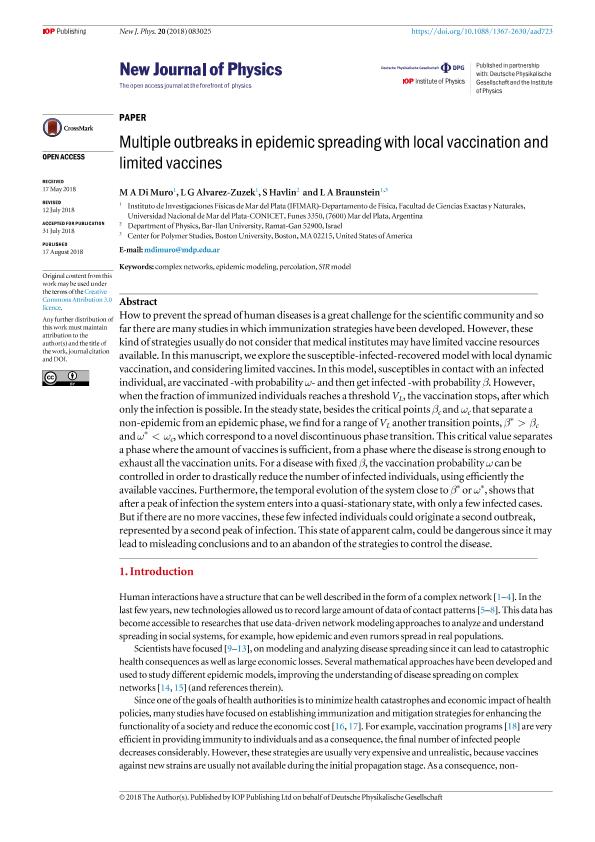Mostrar el registro sencillo del ítem
dc.contributor.author
Di Muro, Matias Alberto

dc.contributor.author
Alvarez Zuzek, Lucila Gisele

dc.contributor.author
Havlin, S.
dc.contributor.author
Braunstein, Lidia Adriana

dc.date.available
2019-11-19T16:01:47Z
dc.date.issued
2018-08
dc.identifier.citation
Di Muro, Matias Alberto; Alvarez Zuzek, Lucila Gisele; Havlin, S.; Braunstein, Lidia Adriana; Multiple outbreaks in epidemic spreading with local vaccination and limited vaccines; IOP Publishing; New Journal of Physics; 20; 8; 8-2018; 830251-830251
dc.identifier.issn
1367-2630
dc.identifier.uri
http://hdl.handle.net/11336/89195
dc.description.abstract
How to prevent the spread of human diseases is a great challenge for the scientific community and so far there are many studies in which immunization strategies have been developed. However, these kind of strategies usually do not consider that medical institutes may have limited vaccine resources available. In this manuscript, we explore the susceptible-infected-recovered model with local dynamic vaccination, and considering limited vaccines. In this model, susceptibles in contact with an infected individual, are vaccinated-with probability ω-and then get infected-with probability β. However, when the fraction of immunized individuals reaches a threshold V L, the vaccination stops, after which only the infection is possible. In the steady state, besides the critical points β c and ω c that separate a non-epidemic from an epidemic phase, we find for a range of V L another transition points, β∗ > β c and ω∗ < ω c, which correspond to a novel discontinuous phase transition. This critical value separates a phase where the amount of vaccines is sufficient, from a phase where the disease is strong enough to exhaust all the vaccination units. For a disease with fixed β, the vaccination probability ω can be controlled in order to drastically reduce the number of infected individuals, using efficiently the available vaccines. Furthermore, the temporal evolution of the system close to β∗ or ω∗, shows that after a peak of infection the system enters into a quasi-stationary state, with only a few infected cases. But if there are no more vaccines, these few infected individuals could originate a second outbreak, represented by a second peak of infection. This state of apparent calm, could be dangerous since it may lead to misleading conclusions and to an abandon of the strategies to control the disease.
dc.format
application/pdf
dc.language.iso
eng
dc.publisher
IOP Publishing

dc.rights
info:eu-repo/semantics/openAccess
dc.rights.uri
https://creativecommons.org/licenses/by-nc-sa/2.5/ar/
dc.subject
COMPLEX NETWORKS
dc.subject
EPIDEMIC MODELING
dc.subject
PERCOLATION
dc.subject
SIR MODEL
dc.subject.classification
Otras Ciencias Físicas

dc.subject.classification
Ciencias Físicas

dc.subject.classification
CIENCIAS NATURALES Y EXACTAS

dc.title
Multiple outbreaks in epidemic spreading with local vaccination and limited vaccines
dc.type
info:eu-repo/semantics/article
dc.type
info:ar-repo/semantics/artículo
dc.type
info:eu-repo/semantics/publishedVersion
dc.date.updated
2019-10-22T15:00:00Z
dc.journal.volume
20
dc.journal.number
8
dc.journal.pagination
830251-830251
dc.journal.pais
Reino Unido

dc.journal.ciudad
Londres
dc.description.fil
Fil: Di Muro, Matias Alberto. Consejo Nacional de Investigaciones Científicas y Técnicas. Centro Científico Tecnológico Conicet - Mar del Plata. Instituto de Investigaciones Físicas de Mar del Plata. Universidad Nacional de Mar del Plata. Facultad de Ciencias Exactas y Naturales. Instituto de Investigaciones Físicas de Mar del Plata; Argentina
dc.description.fil
Fil: Alvarez Zuzek, Lucila Gisele. Consejo Nacional de Investigaciones Científicas y Técnicas. Centro Científico Tecnológico Conicet - Mar del Plata. Instituto de Investigaciones Físicas de Mar del Plata. Universidad Nacional de Mar del Plata. Facultad de Ciencias Exactas y Naturales. Instituto de Investigaciones Físicas de Mar del Plata; Argentina
dc.description.fil
Fil: Havlin, S.. Bar-ilan University; Israel
dc.description.fil
Fil: Braunstein, Lidia Adriana. Boston University; Estados Unidos
dc.journal.title
New Journal of Physics

dc.relation.alternativeid
info:eu-repo/semantics/altIdentifier/url/http://stacks.iop.org/1367-2630/20/i=8/a=083025?key=crossref.49d16e6e4e579763ea0bd78651c8d272
dc.relation.alternativeid
info:eu-repo/semantics/altIdentifier/doi/http://dx.doi.org/10.1088/1367-2630/aad723
Archivos asociados
